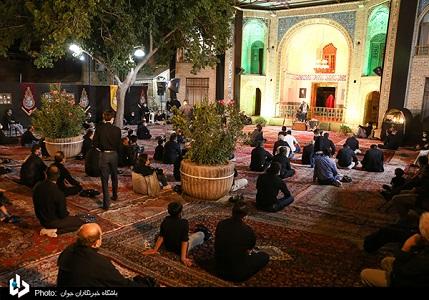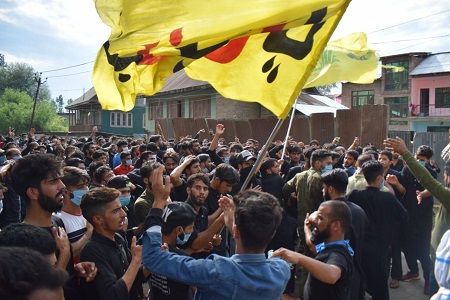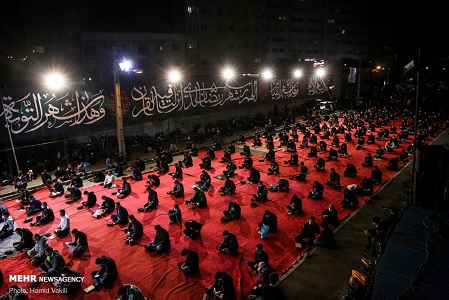To do or not to do?: Internal discussions on holding the religious festivals of Shiite Islam in 2020 during the Covid-19 lockdown

The city of Qazvin (2020) - ceremonies of Ashura with keeping the social distance. With the global spread of the Covid-19 pandemic in 2020, all countries of the world, and consequently most of the world’s religions, faced new conditions and unforeseen problems. One of these issues has been the religious interpretation of the epidemic, the duties of the believers in these circumstances, and the holding of religious ceremonies during the pandemic. Shiite Muslims also faced a large number of these challenges.
Shiite Islam is mainly known for religious rites. In addition to the worship performed by other Muslim sects, the Shiites also perform several rites and rituals. Although Shiites are not alone in performing these acts of worship, and some Sunnis participate in such activities as the pilgrimage to the grave of saints and the commemoration of the martyrdom of Imam Hussein, these acts of worship are essentially linked to Shiite identity.
Several Islamic rites have been affected since the outbreak of the Covid-19 pandemic. Among these are the daily rituals that can be held during group gatherings, such as: congregational prayers, Ramadan ceremonies, Hajj, the celebration of mid-Shaban, the celebration of Ghadir Feast, and the Ashura ceremonies.

Kashmir - The city of Srinagar, 2020 - ceremonies of Ashura without keeping the social distance. Photography by Ubaid Mukhtar / Kashmit Observer
In the early months of the epidemic, there was general confusion among health professionals and policymakers, as well as among religious scholars and religious people about the dimension and threat of this unprecedented pandemic. Although in past centuries, Shiite communities have experienced some historical epidemics, several centuries without such crises and the lack of accurate historiography of such experiences, there was little relevant religious instruction to offer guidance.
It should also be borne in mind that Shiite communıtıes enjoy a particular structure of religious authority and power. Shiites generally refer to their religious scholars in matters of religion and ask them to find out their religious duty. Although referring to religious scholars has a decisive role among Shiites, it cannot be said that an essential part of the Shiites tradition regulates their daily lives according to the instructions of religious scholars. This is true even for Shiites who consider themselves religious. Thus, in addition to religious life, guided by the precepts of the Sharia (Islamic religious law), there are other types of religious authority, including popular beliefs that go beyond the formal religious system.
After the initial confusion about this disease and the lack of sufficient information about its nature, the ways it spreads, and the necessary measures to prevent it, Shiite scholars gradually took a stand against it. A powerful voice was that of Ayatollah Seyyed Ali Sistani, as one of the most influential Iraqi Shia clergy and “source of emulation” to millions of Shiites around the world. Ayatollah Sistani lives in the city of Najaf, in Iraq, and does not have a political position, but he is generally known as the spokesman of Shiite thought in the world. In a detailed letter to Shiites, he called for refraining from holding mourning ceremonies on Ashura this year. Considering Ayatollah Sistani’s the high status and the importance of Ashura to the Shiites, his comments on the modality of holding this ceremony were quite informative.
In a statement published on 30 July 2020, Sistani insisted there were many ways one may express the sadness and sorrow of Ashura. Instead of holding the large conventional ceremonies of Ashura, Sistani commented, the believers could mourn Imam Husayn by way of live feeds transmitted via internet applications or on television stations; or by organising ceremonial gatherings at homes during specific times of the night or day. As for public gatherings, he reiterated that “it is necessary to abide strictly to health regulations, including the application of social distancing regulations amongst attendees, using face coverings, and all other available means, to keep coronavirus epidemic from spreading.”

Iran - The city of Tehran, 2020 - night prayer at the month of Ramazan with keeping the social distance. Photograph by Hamid Vakili / Mehr News
Referring to Muslim’s duties on this pandemic, back in March 2020, Sistani emphasized the obligation of observing the rules prescribed by the medical authorities. He added: “if one does not adhere to the instructions and as a result contracts the illness, then they will not be excused from a religious standpoint. It is not permissible for such a [Covid-19 infected person] person to be around others if there is a probability that the person is contagious and will infect them. If s/he were to do so, causing those who do not know of his/her state of health to be infected, then s/he will be held religiously liable for any harm that s/he caused that person, and if they were to die from the illness, then it is obligatory upon him/her to pay the diyah (religious fine).” As an answer to the question “those who arrive in the country after having been in a country in which the virus had spread widely, or if they had been around those who were infected, and if it would be obligatory for such a person to quarantine himself in his home or must that person get tested to know whether he was infected or not?”, Sistani replied, “yes, it is mandatory for him to do so, taking into account the directions of the respective authorities.” He even agreed to spend a portion of religious taxes “to provide equipment that is necessary to protect from infection by those who have contracted the virus, such as gloves, medical face masks, cleaning supplies, sterilizers, as well as medications and other supplies that are needed to combat this sickness.”However, a limited number of middle-level clerics or religious activists outside the religious education system disobeyed these recommendations and asserted on holding religious gatherings as these happened during previous years, without following recommendations for preventing the spread of disease. Some others claimed that they had found a preventive treatment for Covid-19 in the old religious texts and others called it a “secular virus”, devised to stop the Islamic congregational worships.
This shows the diverse attitudes of the Shiites community towards the official authority of the clerical system. While high-ranking clerics in various Shiite countries upheld the opinion of medical experts, some religious activists overtly disagreed with them and called to hold the religious rites at any cost, even more vehemently than in previous years. They used a range of issues to justify disregard both the advice of medical authorities and high-ranking Shiite clergy, ranging from conspiracy theories to divine assurances that participants in religious ceremonies would not become ill. Although these religious activists who swam against the current were not many, what happened in the Shiite communities, mostly in Iran, Iraq, Lebanon, Bahrain, Afghanistan, Pakistan, and India, where some groups wished to hold the ceremonies of Ashura, unraveled a gap between some religious activists and religious leaders belonging to the jurisprudential tradition, pointing to divergent understandings for the meaning of religious life.
.jpg)
Peyman Eshaghi is PhD. Candidate at the Berlin Graduate School Muslim Cultures and Societies, Free University of Berlin, Germany.
He has previously studied at the University of Chicago, University of Ankara, and the University of Tehran in the fields of anthropology and sociology of religion. His main areas of research are the Hajj and pilgrimage in Islam and Iran-Ottoman relationship. Among his publications are: Muslim Pilgrimage in the Modern World (co-edited with Babak Rahimi, Chapel Hill: University of North Carolina Press, 2019), “To Capture a Cherished Past: Pilgrimage Photography at Imam Riza’s Shrine, Iran”, Middle East Journal of Culture and Communication, 8 (2-3): 2015, 282–306 p. and “Quietness beyond Political Power: Politics of Taking Sanctuary (Bast Neshini) in the Shi’ite Shrines of Iran”, Iranian Studies, 49(3): 2016 (439-512).
Request your prospectus
![]()
Explore our qualifications and courses by requesting one of our prospectuses today.
